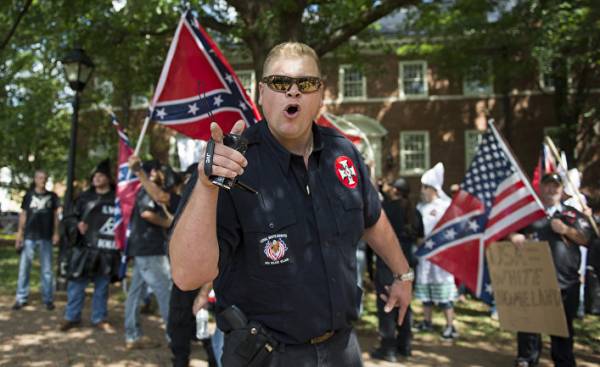
The next day after the riots, manifestations of racist violence and deaths in Virginia state Governor Terry McAuliffe (Terry McAuliffe) was asked: “How did we get here?” However, a more important question after Charlottesville and other episodes with a fatal outcome in Ferguson, Charleston, Dallas, Saint Paul, Baltimore, Baton Rouge and Alexandria — is formulated so: whither the United States? How fragile is this Union, our Republic and country, which has long been considered the most stable democracy in the world? The danger today is much more serious than mass violence. “The radical right has been more successful in the past year from the point of view of entering the political mainstream than in the past half-century, noted in February of this year experts of the human rights organization the Southern Poverty Law Center. Prepared this documents lists more than 900 active (and growing) hate groups in the United States.
The stability of America is increasingly turning into an undercurrent in political discourse. Earlier this year I began a conversation with Keith Minsim (Keith Mines) about the riots in America. Mines has spent his career — a special unit of the us army, the UN, and today the state Department is watching the civil wars in other countries, including Afghanistan, Colombia, El Salvador, Iraq, Somalia, and Sudan. He returned to Washington 16 years later and found that the conditions that give rise to conflicts abroad, now visible and in his homeland. In March of this year the mines was among several experts in the field of national security, which Foreign Policy magazine asked to assess the risk of a second civil war — in percent. Mines came to the conclusion that the probability of outbreak of civil war in the United States in the next 10-15 years is 60%. Predictions by other experts were in the range of 5% to 95%. Sober consensus indicators were at the level of 35%. And all of this happened five months before Charlottsville.
“We continue to say: “Here it is impossible”, but then, good God, it turns out that it’s possible,” said Brahimi in an interview with me on Sunday, after talking about Charlottesville. Model civil unrest developed throughout the world over the last 60 years. Today the civil war include the General of the battle of the trenches along clearly defined geographical lines of front. Among them are many low-intensity conflicts with episodic violence at the constant change of places. By definition, the Mines, the civil war is a large-scale violence, in which the negation of traditional political power. In this case, it requires the intervention of the National guard.
On Sunday, McAuliffe led National guard units in a state of alert and declared a state of emergency. Based on his experience in the field of civil wars on three continents, mines results in five conditions which confirm his prediction: significant national polarization in the absence of an obvious meeting place for conflict resolution; causing more and more strife and media coverage in the information flow; weakened institutions, particularly Congress and the legal system; sale of the responsibility of political leaders or of their refusal to her; and legalization of violence as a “fashionable” way to conduct discourse and for the resolution of disputes.
President trump “modeled violence as a way to promote politically, and also confirmed the possibility of the use of intimidation, both before and after the election campaign”, — said the mines in the pages of Foreign Policy magazine. “Judging by recent events, the left-wing is currently fully utilizing such methods — said he, putting on anarchists in the anti-globalization riots as one of the several hot spots. As in 1859, when everyone went crazy for some reason and everyone had to bear arms”.
In order to test the hypothesis of the Mines, I turned this week to the five well-known historians of the civil war. “When you look at a map of red States and blue States and put on her map of the Civil war — who was allied with whom during the Civil war, it is possible to say that the changes are very small,” — said in a conversation with me Gisberg Judith (Judith Giesberg), editor of the Journal of the Civil War Era, and the historian of Villanova University. — We have not reached agreement about the outcome of the Civil war and of the direction in which the country should go. Made after the war amendments were very controversial — particularly the fourteenth amendment which ensures equal protection before the law, and they remain so today. Which means granting the right to vote to colored people? We still don’t know it.”
“Doesn’t that make us vulnerable in the sense that a repetition of the events of the past? I don’t see a repeat of those specific conditions. But this does not mean that we do not enter into something similar in terms of a cultural war. We are vulnerable from the point of view of racism, tribalism and conflict views on the way ahead for our nation,” she added.
Concerns about the deepening divisions and new conflicts are reflected in popular culture: in April, Amazon have included ditapichai novel “American war” (American War) — the principal topic is the second civil war in the United States — a list of the most popular books of the month. In his review, published in the Washington Post, Ron Charles (Ron Charles) wrote: “In these scarry pages raging the clash, which many of us are anxiously thinking in the era of trump: a nation torn by irreconcilable ideologies, estrangement the result of ingrained suspicion… as painful and horrific”. And here is what was said in the book review, the New York Times: “This is a work of fiction, based on fiction. Yet, at least”. The author of this book Omar El Akkad (Omar El Akkad) was born in Egypt. He worked as a correspondent for the canadian newspaper Globe and Mail and covered the war in Afghanistan, the Arab spring and the protests in Ferguson.
Even before the events in Charlottesville David Blythe (David Blight), a historian from Yale University, already planned to be held in November a conference on “the Disengagement of America, then and now” (American Disunion, Then and Now). “Drawing Parallels and analogies — always a risky business, but we, actually, have weak institutions and polarized not only the party, but the party at risk of collapse, and that was in 1850-ies”, — he said in conversation with me. The question of slavery for 15 years, tearing apart the two main political parties. It destroyed the Whig, the site of which was occupied by the Republican party and divided the Democratic party into Northern and southern part. Therefore, “we need to look at the party” as the indicator of the health of America, he said.
In 1850-ies the Americans are not especially different ability to predict the “shock events” or to absorb it, including the fugitive slave Act, the Supreme court decision in the case of Dred Scott, attempted rebellion of John brown and even Mexican-American war, said Bligh. “No one could predict. These events forced people to change their position, — said Blythe. — Currently we are in the process of changing positions. The election trump is one of the elements of this process, and we are still trying to understand it. But nothing new in this. You may recall the election of Obama. We thought it would send the culture in a different direction, but this has not happened,” he said.
“There was tremendous resistance from the right, and then there was the violence from the police, and all these things (from the past) again blew up. It is not only racial polarization, but also attempted identity”.
“We know there’s a risk of civil war, or something like that, if elections, the adoption of the law, an event, the actions of the government or people in high places — if it becomes unacceptable to any party, a large group of people, a large part of the voters,” added Blyth, assessing the situation as a whole. The nation has witnessed a tectonic shift on the eve of the Civil war and during the era of fighting for civil rights unrest in the second half of 1960-ies and the Vietnam war, he said. “This has not happened in 2000 during the confrontation, Bush — Gore, but then we came very close to this point. And something similar could happen today.”
According to Blythe, there has been a change in public opinion compared to the 1960-ies, and the weakening of political institutions today forced the Americans to change their views on what institutions to trust. “Who can we believe?— he asks. — Perhaps paradoxically, the FBI. If you take all these military people in the administration trump, that with them we associate our hope for the use of reason. It is not the President. It is not Congress that is totally dysfunctional and operated by people who for decades was engaged in dividing us, in order to maintain control, and not even the Supreme court, because it was so politicized.”
After the events in Charlottesville followed by a real chorus of condemnation from politicians across the political spectrum, and it inspires some hope, but not necessarily calming and can serve as some indicator regarding the future, — noted in a conversation with me Gregory downs (Gregory Downs), historian of the University of California. During the Civil war, even the southern politicians who for many years denounced the Department or regarded him warily — including Jefferson Davis (Jefferson Davis), was, in the end, the leaders of the Confederacy. “If the source of the conflict are deeply embedded in cultural or social force, that politics, by definition, can’t keep them with appeals to sanity,” said downs. He called toxic white Suprematists and neo-Nazis “precursors”, not “architects” of the possible collapse of the Republic. However, he cautioned: “We believe our stability is something most for granted”.
In conversation with me, he quoted from the book of journalist Murat Halstead (Murat Halstead) “War claims of the South” (The War Claims of the South). “Lesson of war that we should never forget, is that the American people is no exception to the ordinary fate of mankind. If we sin, we must suffer for our sins like a loose Empire or a vanished nation,” he said.
Eric Foner (Eric Foner), historian at Columbia University, won the Pulitzer prize in 2011 for his book “Trial by fire: Abraham Lincoln and American slavery” (The Fiery Trial: Abraham Lincoln and American Slavery). Like other scientists, with whom I spoke, Foner doubt that the future conflict in America, whatever it was, will recall the last civil war in America. “Obviously, we have deep disagreements on many fronts — racial, ideological, rural areas against the cities, he said in a conversation with me. But I doubt that they are able to lead to civil war. We have strong gravitational forces that oppose what we see today.” He also stressed that “the outbreak in the Charlottesville — the destruction of Robert E. Lee monument — is irrelevant to the Civil war. People are not discussing the Civil war. They discuss today’s American society and the racial question”.
In Charlottesville the so-called alternative right (alt-right) was organized is not the first protest and it won’t be the last. The next weekend scheduled nine such events, and others will be held in September.
Robin Wright is a regular contributor to the New Yorker magazine, her first article was published in this journal in 1988. She is the author of “Shock the Casbah: Rage and rebellion in the Islamic world” (Rock the Casbah: Rage and Rebellion Across the Islamic World).







